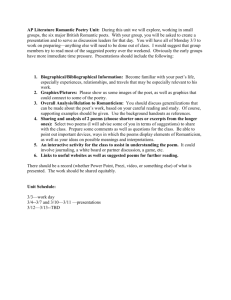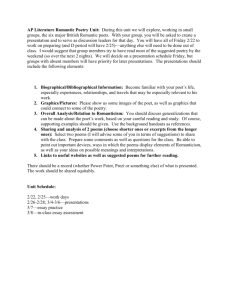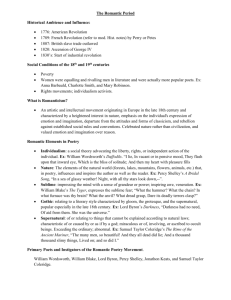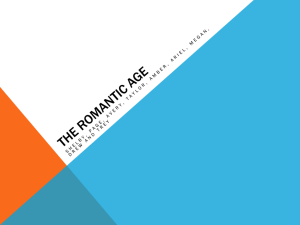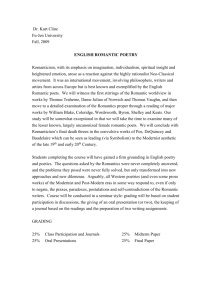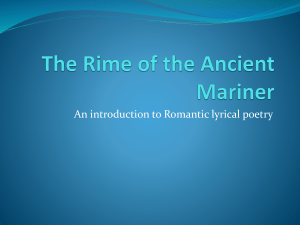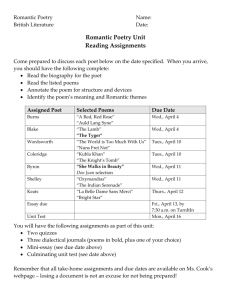English Literature
advertisement
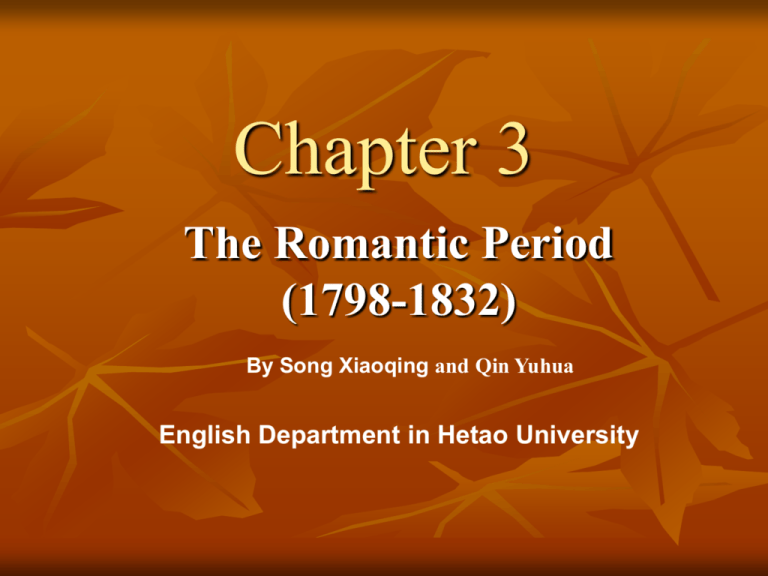
Chapter 3 The Romantic Period (1798-1832) By Song Xiaoqing and Qin Yuhua English Department in Hetao University English Literature I. The Romantic Period: The Romantic period is the period is generally said to have begun in 1798 with the publication of Wordsworth and Coleridge’s Lyrical Ballads and to have ended in 1832 with Sir Walter Scott’s death and the passage of the first Reform Bill in the Parliament. It is emphasized the special qualities of each individual’s mind. English Literature II. the historical and cultural background of English Romanticism a. Historically, it was provoked by the French Revolution and the English Industrial Revolution. b. Culturally, the publication of French philosopher Rousseau’s two books provided necessary guiding principles for the French Revolution which aroused great sympathy and enthusiasm in England; English Literature c. England experienced profound economic and social changes: the enclosure movement and the agricultural mechanization; the capitalist class grasped the political power and came to dominate the English society. English Literature III. Basic Views: Romanticism designates a literary and philosophical theory which tends to see the individual as the very center of all life and all experience. It constitutes a change of direction from attention to the outer world of social civilization to the inner world of the human spirit. The Romantics think literature most valuable as an expression of this or her unique feelings and particular attitudes, and valuing its accuracy in portraying the individual's experiences. English Literature IV. Literature Characters: The English Romantic period is an age of poetry and also a great age of prose. The writers employed the commonplace, the nature, and the simple as their poetic materials in their poems. Gothic novel, a type of romantic fiction that predominated in the late eighteenth century, was one phase of the Romantic Movement. Its principal elements are violence, horror and the supernatural, which strongly appeal to the reader’s emotion. English Literature V. Romanticism: It is a literary trend. It prevailed in England during the period of 1798-1832. Romanticists were discontent with and opposed to the development of capitalism. They split into two groups. Some Romantic writers reflected the thinking of those classes which had been ruined by the bourgeoisie called Passive Romantic poets represented by Wordsworth, Coleridge and Southey. English Literature Others expressed the aspiration of the labouring classes called Active or Revolutionary Romantic poets represented by Byron and Shelley and Keats. English Literature VI. Lake Poets: 1. Wordsworth, Coleridge, Southey. They lived in the Lake District in the northwestern part of England 2. They have radical inclinations in their youth, but later turned conservative and received favors from the Government. 3. They criticize the industrial capitalist society. English Literature VII. Main Writers: A. William Blake(1757-1827): 威廉.布莱克 William Blake had been both a poet and an engraver. Blake was the first important Romantic poet. 1. Main works: Poetical Sketches 《素描诗集》 Songs of Innocence 《天真之歌》It is a lovely volume of poems English Literature Songs of Experience《经验之歌》 It paints a different world, a world of misery, poverty, disease, war and repression with a melancholy tone. Marriage of Heaven and Hell《天堂与地狱 的结合》 The book of Urizen 《尤来森之书》 The Book of Los 《洛斯之书》 Milton《弥尔顿》 English Literature 2.His works’ Characters Childhood is central to Blake’s concern in the Songs of Innocence and Songs of Experience, and this concern gives the two books a strong social and historical reference. In the Marriage of Heaven and Hell, he explores the relationship of the contraries. Attraction and repulsion, reason and energy, love and hate, are necessary to human existence. English Literature 3. Language Characters He writes his poems in plain and direct language. His poems often carry the lyric beauty with immense compression of meaning. He distrusts the abstractness and tends to embody his views with visual images. Symbolism in wide range is also a distinctive feature of his poetry English Literature B. William Wordsworth(1770-1850) 威廉.华兹华斯 1. William Wordsworth, the “Lake Poets,” is the leading figure of the English romantic poetry, the focal poetic voice of the period. Main Works: His Works divided into two groups: Poems about nature and poems about human life. Descriptive Sketches, and Evening Walk 《描写速记,黄昏漫步》 Lyrical Ballads. 《抒情歌谣集》 English Literature The Prelude 《序曲》 Poems in Two Volumes《双卷诗集》 The Excursion《远足》 The Thorn《荆棘》 The sailor’s mother 《水手的母亲》 Michael《麦克尔》 The Affliction of Margaret《玛格丽特所受的折磨》 The Old Cumberland Beggar 《老坎伯兰的乞丐》 Lucy Poems 《露茜》 The Idiot Boy 《白痴男孩》 Man, the heart of man, and human life. The Solitary Reaper 《孤独的收割者》 To a Highland Girl 《致高地姑娘》 The Ruined Cottage 《被摧毁的茅屋》 English Literature 2. Language characters He can penetrate to the heart of things and give the reader the very life of nature. And he thinks that common life is the only subject of literary interest. The joys and sorrows of the common people are his themes. His sympathy always goes to the suffering poor. English Literature He is the leading figure of the English romantic poetry, the focal poetic voice of the period. His is a voice of searchingly comprehensive humanity and one that inspires his audience to see the world freshly, sympathetically and naturally. The most important contribution he has made is that he has not only started the modern poetry, the poetry of the growing inner self, but also changed the course of English poetry by using ordinary speech of the language and by advocating a return to nature English Literature C. Samuel Taylor Coleridge(1772-1834) 塞 缪尔.泰勒.科勒律治 He advocated a more spiritual and religious interpretation of life, based on what he had learnt from Kant and Schelling.他倡导了以坎特与斯凯 灵理论的对人类精神化与宗教化的诠释。 He believed that art is the only permanent revelation of the nature of reality.他认为艺术是唯一一种能 永远揭示现实的形式。 English Literature 1. Main Works: Lyrical Ballads. 《抒情歌谣集》 The Rime of the Ancient Mariner 《古航海家之 歌》,, Kubla Khan 《忽必烈汗》 Christabel 克丽斯特贝尔 This Lime-Tree Bower My Prison Frost at Midnight 《子夜寒霜》, The Nightingale《夜莺》 Dejection, and Ode 《沮丧,一段颂歌》 Tragic Drama: Remorse 《忏悔》 Biographia Literaria 《文学传记》 English Literature 2. His actual achievement His actual achievement as poet can be divided into two remarkably diverse groups: The demonic and the conversational. (神祗 诗与对话诗)。 The demonic group includes his three masterpieces:“The Rime of the Ancient Mariner”“Christabel”“Kubla Khan”Mysticism and demonism with strong imagination are the distinctive features of this group. English Literature His conversational groups include: Kubla Khan, Christabel, The Ancient Mariner, This Lime-Tree Bower My Prison, Frost at Midnight English Literature 3. Language characters He was esteemed by some of his contemporaries and is generally recognized today as a lyrical poet and literary critic of the first rank. His poetic themes range from the supernatural to the domestic. His treatises, lectures, and compelling conversational powers made his one of the most influential English literary critics and philosophers of the 19th century. English Literature D. George Gordon Byron(1788-1824): 乔治.戈登.拜伦 He was born into an ancient aristocratic family. He plunged himself into the struggle for the national independence of that country. on the whole, his poetry is one of experience. His heroes are more or less surrogates of himself. English Literature 1. Main works: Hours of Idleness,《懒散时光》 English Bards and Scotch Reviewers《英格兰诗人和苏格兰评论 家》 Cantos: four cantos of Childe Harold’s Pilgrimage 《恰尔德. 哈罗德游记》(brought Byron fame), Oriented Tales《东方故事》 Donjuan《唐。璜》 Narrative poem: The Prisoner of Chillon, 《齐伦的囚犯》。 The Island《岛》 Drama: Manfred,《曼费雷佳》 Cain,《该隐》 Political satires: Vision of Judgment 《审判的幻境》 English Literature 2. His works’ characters His persistence attacks at on “cant political, religious, and moral”. His descriptions are simple and fresh, often bring vivid objects before the reader. “a stream sometimes smooth, sometimes rapid and sometimes rushing down in cataracts---a mixture of philosophy and slang—of everything”. English Literature He was regarded in England as the perverted man, the satanic poet; while on the continent, he was hailed as the champion of liberty, poet of the people. He enriched European poetry with and abundance of ideas, images, artistic forms and innovations. 拜伦以丰富的思想,想象 力,艺术形式和创新欧洲的诗歌得到了发 展 English Literature E. Percy Bysshe Shelley(1792-1822)波西. 比希.雪莱 He was born into a wealthy family at Sussex. Born in family of the conservative man of the landed gentry. 1. Main works: The Necessity of Atheism《无神论的必然性》, Queen Mab: a Philosophical Poem,《麦希女王: 一首哲理诗》 Alastor, or The Spirit of Solitude《阿拉斯特或孤 独之精神》 English Literature Poem: Hymn to Intellectual Beauty,《颂智力之美》 Mont Blanc《蒙特。布兰卡》 Julian and Maddalo《朱利安和马达罗》 The Revolt of Islam《伊斯兰的叛变》 the Cenci《晨西》 Prometheus Unbound, 《解放了的普罗米修斯》 Four—act drama: Prometheus Unbound. The play is an exultant work in praise of humankind’s potential, and Shelley himself recognized it as “the most perfect of my products.” English Literature Adonais,《阿多那伊斯》 Hellas,《赫拉斯》 Prose: Defence of Poetry 《诗辩》 Lyrics: genuine society,“Ode to Liberty”,《自由颂》 “Old to Naples”《那不勒斯颂》 “Sonnet: England in 1819” The Cloud,《云》 To a Shylark《云雀颂》 Ode to the West Wind 西风颂 Political lyrics: Men of England《致英格兰人民》 Elegy: Adonais《阿多那伊斯》 is a elegy for John Keats’s early death English Literature 2. Personal Characters He grew up with violent revolutionary ideas under the influence of the free thinkers like Hume and Godwin, so he held a life long aversion to cruelty, injustice, authority, institutional religion and the formal shams of respectable society, condemning war, tyranny and exploitation. He expressed his love for freedom and his hatred toward tyranny in several of his lyrics such as “Ode to Liberty”,“Old to Naples”“Sonnet: England in 1819” English Literature Shelley is one of the leading Romantic poets, and intense and original lyrical poet in the English language. Like Blake, he has a reputation as a difficult poet: erudite, imagistically complex, full of classical and mythological allusions. His style abounds in personification and metaphor and other figures of speech which describe vividly what we see and feel. Or express what passionately moves us. English Literature F: John Keats(1795-1821) 约翰.济慈: He was born the son of a livery-stable owner who died when the boy was nine Main Works: Poems: On First Looking into Chapman’s Homer 《初探恰普罗译荷马》 “Sleep and Poetry ”《睡与诗》 Endymion 《安狄米恩》 English Literature Lamia, Isabella, The Eve of St. Agnes, and Other Poems.《拉米亚,伊莎贝拉。圣。亚 尼节前夜及其他诗歌》including: Ode on a Grecian Urn, 希腊古瓮颂” Ode on Melancholy, 忧郁颂 Ode to a Nightingale夜莺颂 Ode to Psyche普赛克颂” Lyrics: To Autumn秋日颂(歇颂) Unfinished: Hyperion希波里恩(海波里安) English Literature 2. Language Characters His poetry is always sensuous, colorful and rich in imagery, which expresses the acuteness of his senses. Sight, sound, scent, taste and feeling are all taken in to give an entire understanding of an experience. He has the power of entering the feelings of others.—either human or animal. His poetry, characterized by exact and closely knit construction, sensual descriptions, and by force of imagination, gives transcendental values to the physical beauty of the world. English Literature G. Jane Austen(1755-1817) 简.奥斯丁 She was born in a country clergyman’s family. 1. Main Works: Novel: Sense and Sensibility 《理智与情感》; Pride and Prejudice;《傲慢与偏见》 (the most popular) Northanger Abbey 《诺桑觉寺》 Mansfield Park .《曼斯菲尔德花园》 English Literature Emma 《爱玛》 Persuasion 《劝告》 The Watsons 《沃特生》 Fragment of a Novel 《小说片段》 Plan of a Novel 《小说的安排》 English Literature 2. Personal Characters She holds the ideals of the landlord class in politics, religion and moral principles; and her works show clearly her firm belief in the predominance of reason over passion, the sense of responsibility, good manners and clear—sighted judgment over the Romantic tendencies of emotion and individuality. English Literature 3. Her Works’ Characters Her works’ concern is about human beings in their personal relationships. Because of this, her novels have a universal significance. It is her conviction that a man’s relationship to his wife and children is at least as important a part of his life as his concerns about his belief and career. Her thought is that if one wants to know about a man’s talents, one should see him at work, but if one wants to know about his nature and temper, one should see him at home. English Literature Austen shows a human being not at moments of crisis, but in the most trivial incidents of everyday life. She write within a very narrow sphere. The subject matter, the character range, the social setting, and plots are all restricted to the provincial life of the late 18th century England. Concerning three or four landed gentry families with their daily routine life. English Literature Her novels’ structure It is exquisitely deft, the characterization in the highest degree memorable, while the irony has a radiant shrewdness unmatched elsewhere. Her works’ at one delightful and profound, are among the supreme achievements of English literature. With trenchant observation and in meticulous details, she presents the quiet, day-to-day country life of the upper-middle-class English.
